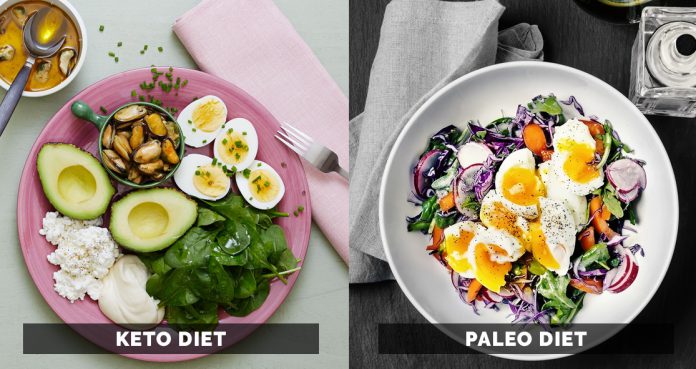The ketogenic (keto) and Paleolithic (paleo) diets are among the most trending diets today. Although they share some similarities, there are a few differences in these diets. Before knowing those differences, you should understand what types of diet they are.
The keto diet mainly focuses on eating a balance of macronutrients. It involves eating low-carbs, high protein, and moderate fats. The aim is to make your body achieve a state of ketosis in which the body starts using fat as a source of energy rather than carbs. The keto diet helps burn fat, aiding weight loss.
The paleo diet mainly focuses on eating foods that humans ate in the Paleolithic era or Stone Age. The aim is to avoid modern processed foods for weight loss.
Both keto and paleo diet share some similarities because they encourage eating foods rich in macronutrients and avoiding processed foods. They also encourage eating meat for protein and healthy fats. They exclude many unhealthful foods such as chips, crackers, packaged snacks, white or brown sugar, and corn syrup.
However, at the same time, they do not recommend eating some of the healthful foods, such as whole grains, legumes, beans, lentils, peanuts, peas, and soy, which should be included in your diet, according to the 2015-2020 Dietary Guidelines for Americans.
So, which one is good for you?
Well, it is a bit difficult to say which diet is good for you because both the keto and paleo diets come with specific recommendations. There are plenty of variations between the two diets and they have been found effective at losing weight because they do not encourage eating highly processed foods.
Switching to the keto or paleo diet is not easy because, for most people, it requires a significant shift from their previous eating habits. Some of them might find avoiding whole grains difficult, while some might face difficulties in increasing their fat intake.
Some experts suggest going for the keto diet or paleo diet because of their similarities, while others are against both the diets and advise people to eat a well-balanced diet.
For instance, bariatric surgeon, Dr. Garth Davis, said, “Non-evidence-based science is floating around, convincing people to eat otherwise. High-protein diets cause chronic diseases.”
“People on ketosis eating a high-protein diet are shooting themselves in the foot,” he added. “Your body so badly wants sugar that you’re denying, your glycogen stores will drop and it will turn your protein into sugar, a metabolic process called gluconeogenesis. A ketogenic diet is very high fat and pretty hard to sustain.” So, before deciding to change your diet, you must check with a doctor or a registered dietician because both the keto diet and paleo diet are particularly not advised for people with certain medical conditions.























